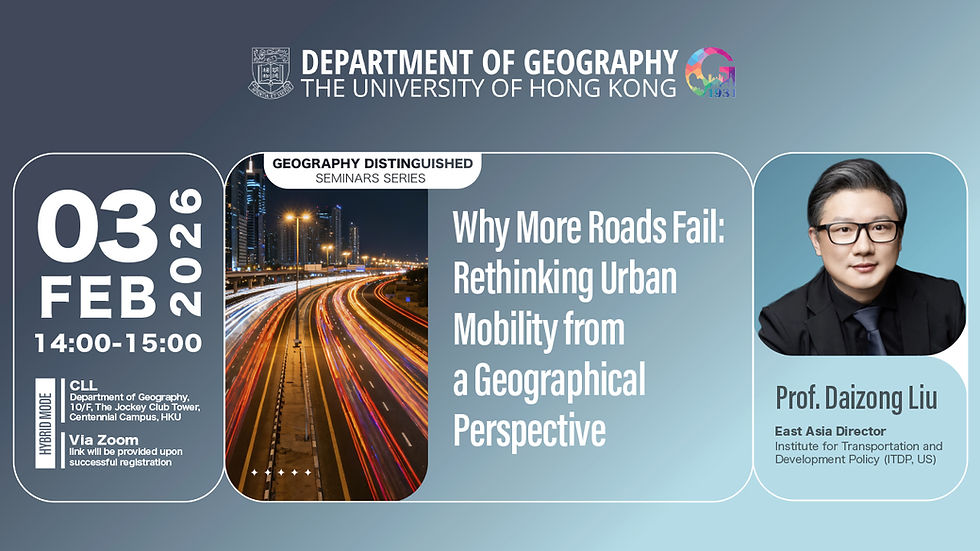13 NOV 2025 (THU) 10:30-12:00
- Nov 13, 2025
- 3 min read
Updated: Dec 17, 2025
Geography Distinguished Seminars Series
Global vegetation trends: projections, observations, drivers, impacts and potential tipping points
Date: 13 NOV 2025 (Thursday)
Time: 10:30-12:00 (HKT)
Venue: CLL, Department of Geography, 10/F, The Jockey Club Tower, Centennial Campus, HKU
Mode: Hybrid
Via Zoom: Zoom link will be provided upon successful registration
Registration link: https://hkuems1.hku.hk/hkuems/ec_hdetail.aspx?guest=Y&ueid=103803
Abstract:
Global vegetation has exhibited pronounced greening over recent decades, yet its long-term trajectory remains uncertain due to complex interactions between natural and anthropogenic factors. This seminar presents advanced modeling analyses, leveraging data-driven attribution frameworks and remote sensing, to elucidate the drivers, impacts, and potential tipping points of vegetation dynamics. Key drivers, including CO2 fertilization, land-use management, nitrogen deposition, and climate variability, are explored through recent studies, revealing their roles in shaping global greening trends. Modeling efforts highlight significant implications for terrestrial carbon sequestration and water availability, with evidence of a declining evapotranspiration trend since the early 21st century. Potential tipping points, driven by deforestation, water limitations, and ecological saturation, pose risks to ecosystem stability. Prof. Zhenzhong Zeng will discuss these findings, drawn from cutting-edge research, and their critical implications for climate change mitigation and sustainable land management. This seminar provides a comprehensive perspective on the future of Earth’s vegetation and its pivotal role in the global climate system.
Professor Zhenzhong Zeng
Professor, Southern University of Science and Technology
Zeng Zhenzhong primarily conducts research in the field of Earth system processes and global change. His work focuses on utilizing ground observation networks, satellite remote sensing technology, and next-generation Earth system models to study the coevolution and coupling relationships among the biosphere, atmosphere, hydrosphere, and anthroposphere in the Earth's surface system. He quantifies the interactions between surface processes and climate change under the influence of human development, providing scientific evidence and theoretical support for environmental protection, resource utilization, and climate change mitigation and adaptation. Zeng has received numerous accolades, including the Distinguished Professor under the Ministry of Education’s Changjiang Scholars Program, Ministry of Education Young Chang Jiang Scholar (Earth System Science), Qiushi Outstanding Young Scholar Award, Shenzhen High Level Professionals–(National Leading Talents, and the Kamide Lecture Award from the Asia-Oceania Geosciences Society (AOGS). He has published over 140 academic papers, with 66 of them as the first or corresponding author in high-impact journals, including Science (1), Nature Climate Change (2), Nature Geoscience (3), Nature Sustainability (4), Nature Water (2), Nature Communications (1), One Earth, Science Bulletin, and the Journal of Remote Sensing. His work has been cited 14,058 times on Google Scholar, with an h-index of 48 and an i10-index of 88 (as of May 27, 2024). His research findings have supported IPCC reports and have been featured in media outlets such as Reference News, China Science Daily, BBC, and Bloomberg. His study on deforestation in the mountainous regions of Nan Province, Thailand, has been included as a case study in the ecology textbook "The Ecology of Plants." His main academic services include serving as a member of the Chinese Committee of the International Association of Hydrological Sciences, a peer review expert for the IPCC Sixth Assessment Report, and an editorial board member for journals such as Remote Sensing Technology and Application, CABI Agriculture and Bioscience, and Sustainable Horizons. He has also been a peer reviewer for over 30 SCI academic journals, including Nature, Nature Sustainability, and Science Advances. From 2020 to 2023, he was consecutively listed as a Highly Cited Researcher by Elsevier in Cross-Field and Environmental Science and Ecology, and he was included in Stanford University's 2022 list of the World's Top 2% Scientists.












Comments